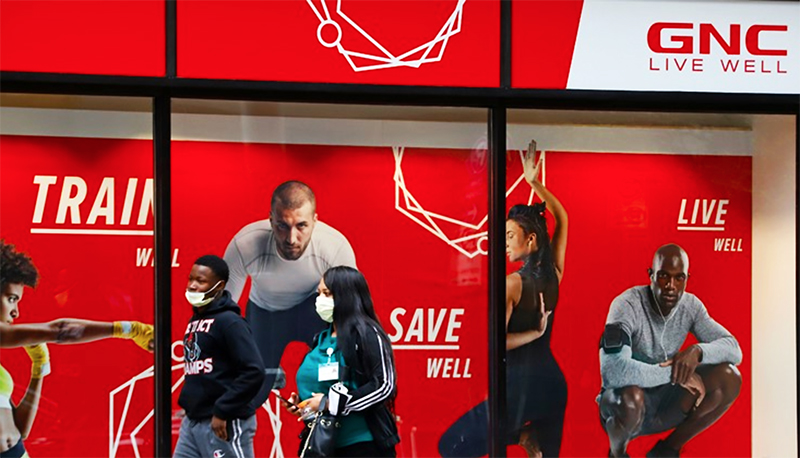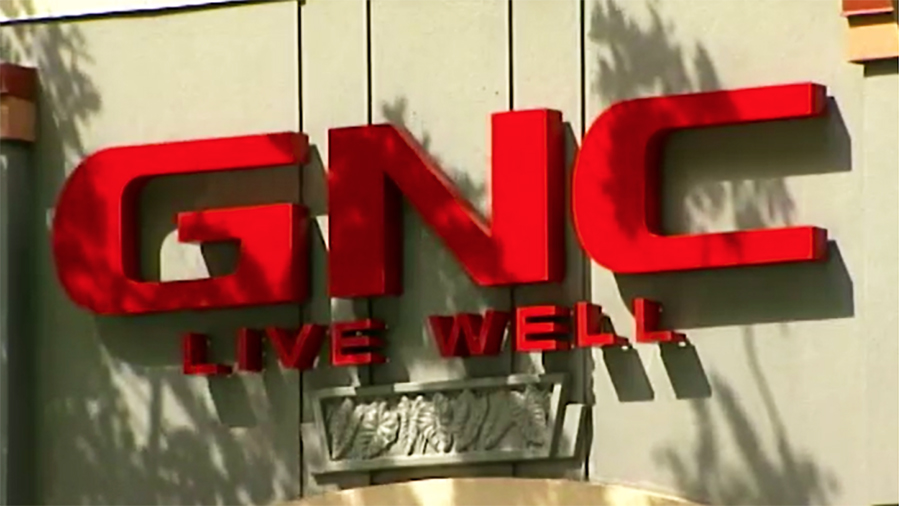GNC Holdings Inc., the parent company of health and wellness retailer GNC, filed for Chapter 11 bankruptcy protection in Delaware with plans to sell the company and close “at least 800 to 1,200 stores.” The move comes after its latest effort to manage its debt load unraveled amid the coronavirus pandemic.
The Pittsburgh-based chain, which had approximately 5,200 retail locations in the U.S. and 7,300 locations globally as of March 31, said it had been under “financial pressure for the past several years,” but when COVID-19 accelerated, the need to file for bankruptcy protection loomed.
As a result of stay-at-home orders globally, GNC temporarily closed approximately 1,200 domestic retail locations, 118 domestic franchise locations, 477 international franchise locations, and 106 Canadian locations, according to court papers. Prior to the pandemic’s emergence, a special committee of GNC’s board and its advisors were actively engaged in a series of negotiations with its Asia-based lenders.
Tricia Tolivar, EVP and CFO, said in an affidavit, “These unprecedented events severely impacted the company’s business and liquidity as well as its ability to consummate a comprehensive refinancing.”
In a news release, GNC said it had reached an agreement with its key stakeholders “to pursue a dual-path process that will allow the company to restructure its balance sheet and accelerate its business strategy through Chapter 11 of the U.S. Bankruptcy Code.”
GNC said it began the process with a potential buyer and agreement in principal with an affiliate of its largest shareholder, China-based Harbin Pharmaceutical Group Holding Co. Harbin and other potential co-investors will serve as a so-called stalking-horse bidder of the company’s assets in a court-supervised sale process.
The agreement sets an initial bidding price of $760 million for GNC, subject to a bankruptcy judge’s approval. A higher bid may be presented and accepted and would be implemented instead of just the standalone plan transaction, according to the company. It also includes support from its largest vendor and joint venture partner IVC.

The company said it has obtained about $130 million in committed additional liquidity from some of its secured lenders in the form of new financing and loan amendments. GNC said it expects to confirm a standalone reorganization plan or consummate a sale that will enable its business to exit the bankruptcy process this fall.
“The Restructuring Support Agreement ensures that the debtors will have sufficient liquidity to pursue both the Sale Transaction and the Standalone Plan Transaction,” wrote Tolivar in the affidavit.
Importantly, she noted that the Restructuring Support Agreement:
- enjoys the support of holders of more than 92 percent of the Tranche B-2 Term Loans and 87 percent of the ABL FILO Term Loans;
- ensures that the debtors will have approximately $130 million in additional liquidity through a commitment from certain of the Prepetition Tranche B-2 Term Loan Lenders to provide $100 million in “new money” debtor-in-possession financing and approximately $30 million to come from certain modifications to the existing ABL/FILO Credit Agreement; and
- contemplates that the debtors will emerge from bankruptcy either by consummating the Sale Transaction or the Standalone Plan Transaction no later than 141 days following the bankruptcy petition date.
The Pittsburgh-based company has struggled in recent years, clawing its way out of difficulty in February 2018 when it refinanced its loans and lined up a $300 million investment from Harbin.
In November 2018, GNC announced that it would close up to 900 stores over the next three years in the U.S. and Canada as leases expired. In July 2019, the retailer said it planned to focus the closings on mall locations.
With the bankruptcy, GNC said it plans to accelerate the closings and would be “exiting unfavorable lease terms burdening our business more quickly and shifting resources to our standalone store locations where we are seeing significantly more consumer foot traffic.”
GNC traces its roots to 1935 when David Shakarian opened a health-food shop selling yogurt and sandwiches in Pittsburgh. The chain rode a wave of interest in nutrition, eventually expanding to over 9,000 outlets. It employed about 12,400 people at year-end. GNC now specializes in selling vitamins and minerals, herbal supplements sports nutrition and diet products.
The Chapter 11 petition filed in U.S. Bankruptcy Court in Delaware listed liabilities in the range of $1 billion to $10 billion. The top unsecured creditors were:
- The Bank Of New York Mellon Trust Company, N.A, $157,899,413.00
- Woodbolt Distribution, $4,853,286.39
- Simon Property Group, $4,562,909.27
- Nutrivo LLC, $4,012,113.14
- Brookfield Property Partners L.P, $3,764,737.11
- Optimum Nutrition Inc., $3,422,764.70
- Lifelong Nutrition Inc., $3,143,221.35
- Resvitale LLC, $2,585,001.74
- Jym Supplement Science, $2,308,093.67
- Jasper Products LLC, $1,942,771.06
- Das Labs LLC, $1,941,436.18
- Adaptive Health LLC, $1,797,132.50
- Fedex, $1,459,464.00
- Basic Research, $1,436,989.79
- Redcon1 LLC, $1,331,896.60
- VPX Sports, $1,154,128.40
- BPI Sports, $1,076,852.45
- Vital Proteins, $1,042,248.78
- NDS Nutrition, $1,038,573.76
- Ghost LLC, $1,032,607.20
- Myaderm Inc, $970,830.37;
- Sonoma Nutraceuticals Inc., $945,477.28
- Facebook Inc, $860,000.00
- Nutravail LLC, $844,259.71
- Google Inc., $830,000.00
- 24‐7 Intouch Inc., $750,000.00
- Hormel Financial Services, $748,512.42
- Herbal Brands Inc., $740,763.26
- Hybrid Promotions LLC, $728,279.50
- Commission Junction LLC, $720,000.00
Photos courtesy GNC
















